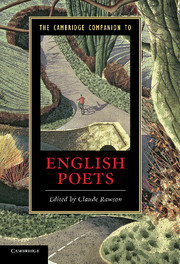Book contents
- Frontmatter
- Introduction
- 1 Geoffrey Chaucer
- 2 Thomas Wyatt
- 3 Edmund Spenser
- 4 William Shakespeare
- 5 John Donne
- 6 Ben Jonson
- 7 George Herbert
- 8 John Milton
- 9 Andrew Marvell
- 10 John Dryden
- 11 Jonathan Swift
- 12 Alexander Pope
- 13 William Blake
- 14 Robert Burns
- 15 William Wordsworth
- 16 Samuel Taylor Coleridge
- 17 George Gordon, Lord Byron
- 18 Percy Bysshe Shelley
- 19 John Keats
- 20 Alfred Lord Tennyson
- 21 Robert Browning
- 22 Emily Brontë
- 23 Christina Rossetti
- 24 Thomas Hardy
- 25 William Butler Yeats
- 26 D. H. Lawrence
- 27 T. S. Eliot
- 28 W. H. Auden
- 29 Philip Larkin
- Further Reading
- Index
20 - Alfred Lord Tennyson
Published online by Cambridge University Press: 28 May 2011
- Frontmatter
- Introduction
- 1 Geoffrey Chaucer
- 2 Thomas Wyatt
- 3 Edmund Spenser
- 4 William Shakespeare
- 5 John Donne
- 6 Ben Jonson
- 7 George Herbert
- 8 John Milton
- 9 Andrew Marvell
- 10 John Dryden
- 11 Jonathan Swift
- 12 Alexander Pope
- 13 William Blake
- 14 Robert Burns
- 15 William Wordsworth
- 16 Samuel Taylor Coleridge
- 17 George Gordon, Lord Byron
- 18 Percy Bysshe Shelley
- 19 John Keats
- 20 Alfred Lord Tennyson
- 21 Robert Browning
- 22 Emily Brontë
- 23 Christina Rossetti
- 24 Thomas Hardy
- 25 William Butler Yeats
- 26 D. H. Lawrence
- 27 T. S. Eliot
- 28 W. H. Auden
- 29 Philip Larkin
- Further Reading
- Index
Summary
You take up Tennyson for either of two reasons. One is the depth of his appeal as a superb artist, the other is the breadth of his historical pertinence as a pre-eminent Victorian. You stay with Tennyson, though, for both reasons, because it is a peculiarity of his achievement to have contrived their interdependence. His staying power derives from the care with which he tended, and the persistence with which his poems treat, the relationship between the terms of his art and the conditions of his fame. If a sweet tooth for words attracts you to a voice that can do this –
Myriads of rivulets hurrying thro’ the lawn,
The moan of doves in immemorial elms,
And murmuring of innumerable bees
– or if an ear for broken-hearted alienation awakens to the likes of this –
He is not here; but far away
The noise of life begins again,
And ghastly thro’ the drizzling rain
On the bald street breaks the blank day
– then it is just a matter of time until acquaintance with such sheer beauty ripens into an understanding that The Princess (1847) and In Memoriam (1850) not only flex verbal power but also reflect on how that power may conspire with cultural power of other kinds: Victorian gender hierarchy, say, or the routinization of urban daily living. Conversely, if an interest in Victorian modernization is what draws you to Tennyson on the evolutionary struggle between science and faith, the massive dislocation of custom that was wrought by industrialization, or the globe-sweeping hubris of empire, what holds you there is the haunted and cadenced decorum with which he articulated such developments.
- Type
- Chapter
- Information
- The Cambridge Companion to English Poets , pp. 376 - 391Publisher: Cambridge University PressPrint publication year: 2011



